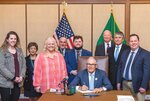

OLYMPIA – After nearly seven years of grief and frustration combined with determined dedication, Twisp resident Deana Knowlton was invited to witness the signing of a homicide victims’ support bill by Governor Jay Inslee at the state capitol April 20.
The governor’s signing of SHB 1501 providing additional counseling services for immediate family members of homicide victims signals both the culmination of one campaign but the beginning of a new one. Knowlton said she will focus next on more measures to bring more help, resources, and relief to crime victims.
“I would like to use my experience to help guide other families through similar difficulties,” said Knowlton. “Knowing what steps to take and where to go and who to contact will help others get through the ordeal.”
Knowlton’s first-hand experience with the loss of her husband, Gary, to a drunk hit-and-run driver in July 2016, set her on a course she would not wish on another family, the fight to see the driver atone for his crime and the struggle for more help for crime victims.
The 22-year-old Bridgeport driver Jovany Lopez-Maciel, was eventually apprehended, convicted at trial, sentenced to prison, granted early release, and deported to Mexico. In 2020 Knowlton learned that Maciel had returned to Washington state when he was stopped by the Washington State Patrol for a vehicle moving violation in the Yakima area and had to appear in court. Despite the violation no further deportation could be taken against Maciel because the Department of Corrections had closed his case and immigration authorities’ hands were tied against further deportation proceedings.
Designated a sanctuary state in 2019, Washington has some of the nation’s strongest immigration protection mandates. They broadly bar local law enforcement from cooperating with federal authorities involving issues of immigration holds, detention and information.
Knowlton said her experience with the state’s legislative process taught her that efforts to change sentencing guidelines and incarceration terms involve many moving parts and are difficult to influence. On the other hand, lobbying for more rights and resources for crime victims offer more opportunities for real progress as Knowlton has demonstrated.
“This is just the beginning,” said Knowlton.
Comments
No comments on this item Please log in to comment by clicking here